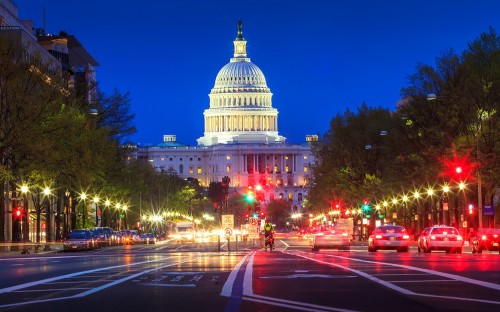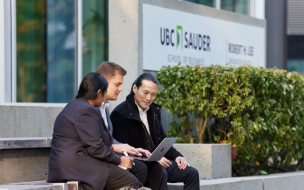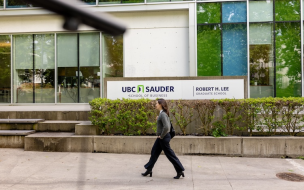The computer science graduate only had eyes for Deloitte, the consultancy, best known for propelling MBAs into promising US-based advisory careers.
But Junaid’s primary concern was obtaining a work visa. As an international student, his future career hung in the balance at Georgetown’s McDonough School of Business.
There were several instances where the bright young consultant was brushed off by firms’ recruiters. Unfortunately for Junaid, the only problem was his nationality.
“Firms would not be willing to interview me because they were only hiring domestic students – even big name firms such IBM Consulting had restrictions around sponsoring a visa for international students,” he says.
Some of his friends wanted US-based careers in marketing but were similarly made to plead their cases to recruiters, who disliked their lack of exposure to the American way of life and markets.
“As an international student there are some job profiles where it's very hard to justify to a recruiter that you're a good fit,” says Junaid.
He adds: “The number of companies hiring international students is typically very low… Several firms like to avoid incurring that additional cost and dealing with the legal hassle, and hence hire only domestic students.”
Although he has since been hired by Deloitte, based in Chicago, Junaid’s past plight is shared by many internationals hoping to mint their fortunes in the States.
Scores of MBA candidates are drawn to the US-based schools, which have dominated MBA rankings for years. The Graduate Management Admissions Council says 87% of international students who study in the United States seek employment there after graduating.
The elites are stunningly difficult to get into to – and even if you do, the chances of securing an MBA job after graduation are seemingly slim. Schools post impressive employment statistics, yet recruiter surveys reveal a darker side to US employment.
GMAC, a reputable provider of MBA data and owner of the GMAT exam, stoked controversy last month when it published a wide-ranging survey on MBA alumni, revealing reluctance among employers to hire internationals.
A huge increase in employers planning to hire MBA graduates was pencilled into GMAC’s report, which drew data from 600 employers in 44 countries. Except for many of those in the US.
For international students, who increasingly populate the majority of US MBA classes, the outlook was gloomy.
More than 50% of US respondents said they will not hire candidates that require a visa. Only 23% plan to hire graduates who require a work visa this year. And the percentage of US companies stating that they will not employ such candidates vastly exceeds the share of Asia-Pacific or European companies unwilling to do so.
This has some schools worried. “This does indeed concern us as our international student population continues to increase year over year. Nearly all international students who pursue the MBA degree at our school hope to gain the experience of US employment,” says Gil Yancey, executive director of the George Washington University School of Business' career centre.
Many firms are reluctant to take on international MBA graduates. Even when they do, they can’t control whether they secure a visa because the system operates like a “lottery”.
The US government offers a batch of H1B visas, the typical work permit employers use to hire foreigners, but supply is limited: just 65,000 are dished out for Bachelor’s graduates, and a lesser 20,000 for those who hold advance degrees such as MBAs, according to data from to H1 Base, a US immigration, visa and employment solutions centre.
“This quota is exhausted at lightning speed,” says Gil. If the lottery does not fall in the students’ favour, many employers who have invested in training them have wasted their time and money.
“For this reason employers prefer the easier route, which is to invest in a domestic student who they can easily hire, retain and get a return on their investment,” adds Gil.
Karen Kouagou, associate director of the MBA career centre at Georgetown, says: “Employers may not be willing to risk the financial and training investment to hire an international graduate knowing there is no guarantee the H1B visa will be approved after it has been submitted.”
No matter how well educated an international MBA is, then, they will need to bring something extraordinarily special to convince US employers to take a punt.
Schools, though, can console themselves with impressive overall hiring stats.
Jonathan D. Masland, a director at the career development at Dartmouth College: Tuck, says: “International students have higher offers of employment than domestic [students] for the first time as of June 2014.”
It was early 2010 when Alejandro Correa Ibargüengoitia left Mexico for better prospects in the United States.
The A.T. Kearney consultant had transferred from his firm’s Mexico City office to New York, lured by the carrot of meteoritic career advancement.
He was only in the Big Apple for two years when he realized an MBA would cement his lofty ambitions. “Having a US education places you at the top of the pack in Latin America,” says Alejandro.
About to graduate from Chicago Booth’s two-year MBA program, the confident consultant did not even look into jobs that required a permanent work visa.
“The reality is that if there were jobs I became aware of that required permanent work authorization then my interest simply dropped, sharply,” he says.
Alejandro’s opinion has many in the MBA community concerned. He is not the only international student to shy away from some US-based work because of the furrow surrounding work visas. He has just secured a job in the US.
The ultimate fear is that scores of MBA applicants will be put off flocking to the United States’ business schools. This is made worse due to the lengthier two-year program’s that are traditional in the country, compared with the 12-month MBA which is favoured in Europe.
Gil from Washington says: “These students may gravitate to countries with immigration laws that are easier to navigate than those in the US.” But he adds that for now Washington only sees an increase in applications.
Others are more bullish. Baltasar Pena, an Indian MBA graduate of Hult International Business School who now works in Boston, says: “Obviously this is a big problem. After leaving my institution I realized its reducing the number [of international students].”
If prospective international students don’t get into a top-ranking school, they often stay in their home countries. “Several friends of mine who didn't get admitted at a high ranking business school decided not to pursue their MBA in the US,” says Junaid from Georgetown. “Others pursued their MBA at Indian business schools,” he added.
A lack of hiring opportunities puts international MBAs at a disadvantage, while domestic candidates have the pick of the litter. Jack Oakes, assistant dean for career development at Darden School of Business, says international MBA’s job searches can be more time consuming and difficult.
It is thought that these students have to surmount additional challenges. Karen from Georgetown’s career centre says they have to make an extra effort to polish their business English language skills. "And network extensively to connect with key decision-makers in their target organizations," she adds.
It sounds like a tall order. The result has been a bevy of business schools branching out into new territories; Africa has been a key destination for the world's top ranked schools. By launching campuses overseas, they can help candidates can gain a US MBA without ever leaving home.
But many graduates are willing to jump through hoops to get hired.
“It’s an expensive proposition to go for a two-year MBA at a credible school, so people think about it because if they have to take loans out [then] they’re really in the hole when they graduate,” says Paul J. Binder, associate director of graduate career services at the Kelly School of Business.
“[But] that’s another reason why they want jobs in the US – because they typically pay more than in their home countries.”
RECAPTHA :
6d
2b
a1
9c








